

Insights From The Most Successful Investors In History. Is US economic growth over? Robert J.
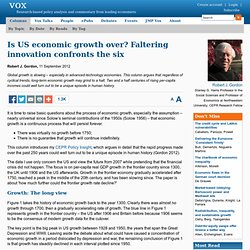
Gordon, 11 September 2012 Global growth is slowing – especially in advanced-technology economies. This column argues that regardless of cyclical trends, long-term economic growth may grind to a halt. Two and a half centuries of rising per-capita incomes could well turn out to be a unique episode in human history. Noahpinion: R vs. g. In his new book, Thomas Piketty argues that R, the rate of return on capital (which is different than the safe interest rate "r") is greater than g, the rate of economic growth, and that this fact can be expected to continue into the indefinite future, resulting in an ever-rising capital share of income and an ever-falling labor share.

The big question is whether R really will be greater than g into the foreseeable future. The "robots" argument basically says: "Labor" is just the flow income from renting out one specific type of capital, i.e. human capital. If technology continues to make more and more obsolete, then the value of human capital will fall as a percentage of total capital, and thus labor's share of income will continue to fall toward zero. That's the scenario I considered in this Atlantic article a while back. This thesis is supported by the research of Loukas Karabarbounis and Brent Neiman, and is often labeled the "rise of the robots" in econ blog discussions. A region's gross domestic product, or GDP, is one of the ways of measuring the size of its economy.
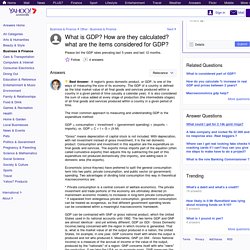
The GDP of a country is defined as the total market value of all final goods and services produced within a country in a given period of time (usually a calendar year). It is also considered the sum of value added at every stage of production (the intermediate stages) of all final goods and services produced within a country in a given period of time. The most common approach to measuring and understanding GDP is the expenditure method: Scott Sumner Busts Krugman. 31 Jan 2015 Scott Sumner has been lighting it up at EconLog in his running commentary against Keynesians, notably Paul Krugman.

(The two most recent examples are here and here, but it goes back further.) Scott’s running theme here is that guys like Krugman picked the U.S. austerity episode as the hill to die on, and then when they died, they not only didn’t see the problem, but instead ran around bragging about how awesome their model had performed! Scott has made an analogy (one I made in the past, as well) with the Keynesian debacle over the Obama stimulus package, where the economy did worse *with* the stimulus than the Keynesians were warning would happen *without* the stimulus. Regarding the sequester, the opposite happened: The economy did better *with* the “austerity” than they predicted would happen *without* spending cuts and tax hikes. 01.pdf. Global Imbalances & Interest Rates. Great Leap Forward » BRAD DELONG: WE’RE ALL MINSKIANS NOW!
Author: L.
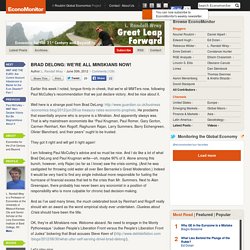
Randall Wray · · Share This Print 20 22 Earlier this week I noted, tongue-firmly-in-cheek, that we’re all MMTers now, following Paul McCulley’s recommendation that we just declare victory. And be nice about it. Discussion Future Work. We are trapped in a cycle of credit booms - FT.com. Hayek, Keynes and How to Prevent Economic Crises: Sylvia Nasar. Sept. 13 (Bloomberg) -- Unlike the movies, life rarely permits second takes.
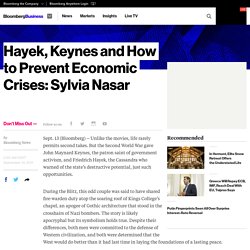
But the Second World War gave John Maynard Keynes, the patron saint of government activism, and Friedrich Hayek, the Cassandra who warned of the state’s destructive potential, just such opportunities. During the Blitz, this odd couple was said to have shared fire-warden duty atop the soaring roof of Kings College’s chapel, an apogee of Gothic architecture that stood in the crosshairs of Nazi bombers.
The introduction of the euro was an important event for the world economy and the international political system.
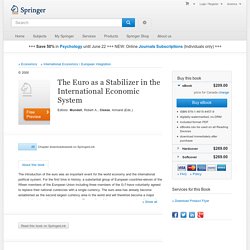
For the first time in history, a substantial group of European countries-eleven of the fifteen members of the European Union including three members of the G-7-have voluntarily agreed to replace their national currencies with a single currency. The euro area has already become established as the second largest currency area in the world and will therefore become a major player in the international monetary system. The creation of the euro poses a number of interesting questions.
Critics on Economists. Liberty Street Economics. Kenneth D.
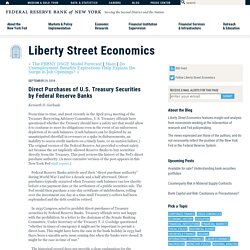
Garbade From time to time, and most recently in the April 2014 meeting of the Treasury Borrowing Advisory Committee, U.S. The Marxist at UBS and His Confusion. George Magnus, Senior Economic Adviser at UBS is a Marxist.
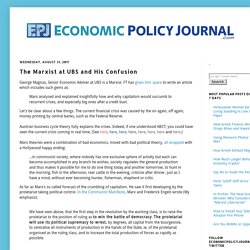
FT has given him space to write an article which includes such gems as: Marx analysed and explained insightfully how and why capitalism would succumb to recurrent crises, and especially big ones after a credit bust. Most European countries are rather small, yet we know little about their monetary history.
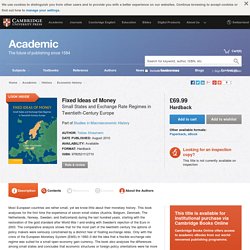
This book analyses for the first time the experience of seven small states (Austria, Belgium, Denmark, The Netherlands, Norway, Sweden, and Switzerland) during the last hundred years, starting with the restoration of the gold standard after World War I and ending with Sweden's rejection of the Euro in 2003. The comparative analysis shows that for the most part of the twentieth century the options of policy makers were seriously constrained by a distinct fear of floating exchange rates. Only with the crisis of the European Monetary System (EMS) in 1992–3 did the idea that a flexible exchange rate regime was suited for a small open economy gain currency. The book also analyses the differences among small states and concludes that economic structures or foreign policy orientations were far more important for the timing of regime changes than domestic institutions and policies.
: FocusEconomics search results. India: Inflation hits over-one-year high; decline in wholesale prices softens in NovemberDecember 15, 2015Consumer prices in November increased 0.40% over the previous month, which was below October’s 0.56% rise.Read more Tags: East & South Asia, India, InflationPhilippines: Exports contract for seventh consecutive month in OctoberDecember 14, 2015Philippine exports have been falling since April and continued to contract in October, although at a softer pace than in the previous month.Read more Tags: ASEAN, Philippines, TradeIndia: Industrial production picks up steam, expands at multi-year highDecember 14, 2015In October, industrial production expanded a notable 9.8% compared to the same month last year.Read more Tags: East & South Asia, India, IndustrySouth Africa: South African rand hits new record-low level in early-DecemberDecember 14, 2015South Africa’s rand (ZAR) has lost ground against the U.S.
As I covered in yesterday's update, "The one with the jaw dropping drop," the Swiss National Bank surprised markets yesterday with the announcement of the end of Swiss Franc's peg to the Euro at 1.20 EUR/CHF. Many traders lost or gained a bunch of pips money on the shock... and some firms even went bankrupt. As for me, I sure did make money on my EUR/USD bearish trade, but I also had an automated position on EUR/CHF to go bullish once the pair hits 1.20... and I sure lost a bunch on the drop.
By Rajesh Kumar Singh and Manoj Kumar NEW DELHI Mon Feb 9, 2015 8:20pm IST NEW DELHI (Reuters) - Taken at face value, India on Monday became the fastest growing major economy in the world after its statisticians changed the way they measure Asia's third-largest economy and showed it clocked faster growth than China in the December quarter. It marks a dramatic turnaround for an economy that a fortnight ago was assumed to be struggling to gain momentum under Prime Minister Narendra Modi's reform-minded government. Prior to Modi's election last May, the economy had endured its weakest phase of growth since the 1980s. The statistical recovery is in large measure due to changes both in the way authorities calculate gross domestic product (GDP) and the base year.
Here's a graph I got from the data, comparing corporate profits of the finance industry vs the non-financial industries from 1964 to 2012. Notice the divergence of profits of the non-financial (real) sector in the 90-ies, and particularly in the pre-crisis boom. The rise of profits in the real sector was immense compared to the financial sector at that time. In fact throughout the past 50 years the gap in total profits between finance and the real sector was widening (albeit a few episodes). Report of the commission on the measurement of economic performance et soci.
Economist's View: New Classical, New Keynesian, and Real Business Cycle Mod. [This is an edited version of something I've posted here in the past. I'm hoping others will be motivated to add to (or correct) this history.] The term "New Classical economics" is often used as though it is one of the dominant models in macroeconomics, but the term has a very specific meaning and refers to a class of models that is no longer popular. The New Classical model has four important elements, the assumption of rational expectations, the assumption of the natural rate hypothesis, the assumption of continuous market clearing, and an assumption that agents have imperfect information (imperfect information drives cycles in these models).
The New Classical model is important for the foundation it provided for later models, the movement in macroeconomics toward microeconomic foundations and the use of rational agents within macro models in particular, but the model itself could not simultaneously explain both the duration and magnitude of actual cycles. How to Prevent a Depression.
Phantom Crises (Wonkish) - NYTimes.com. Global flows in a digital age. Principles of Macroeconomics: Section 13 Main. Economic Theory. What have Keynesians learnt since Keynes? EconomicPolicyJournal.com: Incredible: DeLong-Krugman Go Out of 2012 with a. Mainly macro: Do not underestimate the power of microfoundations. A tale of two systems.